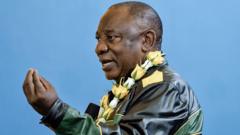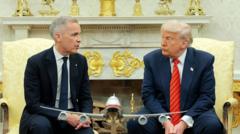With stakes high, Ramaphosa's diplomatic skills are on display as he aims for improved trade relations between the two nations.
Can Cyril Ramaphosa Bridge the Divide with Trump During White House Visit?

Can Cyril Ramaphosa Bridge the Divide with Trump During White House Visit?
South Africa's President faces a pivotal moment in US relations as he meets Trump amid tensions.
In what could be a pivotal moment for US-South Africa relations, President Cyril Ramaphosa is set to meet with President Donald Trump at the White House, marking their first official encounter. Ramaphosa, who played a key role in dismantling apartheid as the chief negotiator for Nelson Mandela's African National Congress (ANC), faces a delicate challenge: to mend ties that have soured in recent months.
The president emphasized the importance of trade during his recent visit to Washington, stating, “The trade relations are what's most important – that’s what has brought us here. We want to come out of the United States with a really good trade deal to strengthen our relations.”
However, the road to improved relations is fraught with difficulty. Trump has repeatedly made controversial claims regarding the safety of South Africa's white Afrikaner community, labeling their situation a "genocide," a term that has been heavily criticized and discredited. Tensions escalated after South Africa passed a controversial land expropriation bill allowing the government to seize private land, further straining ties with the Trump administration.
In a show of solidarity for the Afrikaner community in the US, Trump suspended significant aid to South Africa earlier this year and suggested offering refuge to disgruntled farmers, adding fuel to the already heated rhetoric. This narrative gained traction following the expulsion of South Africa's ambassador, raising alarms about potential diplomatic fallout.
Political analyst Anthoni van Nieuwkerk suggested Ramaphosa's White House visit is a high-risk maneuver. If rational discussions prevail, the meeting may prompt a respectful exchange, moving toward a reset in relations. Conversely, he warned that should discussions turn emotional or focus on the contentious claims of genocide, the meeting could devolve, undermining diplomatic efforts.
Ramaphosa is known for his negotiation prowess, a skill that may be critical in steering the conversations. He has also invited Trump for a friendly round of golf at the upcoming G20 Summit in South Africa, potentially leveraging shared interests to foster goodwill. Additionally, he has brought professional golfers along to the White House, further emphasizing the potential for informal bonding.
Experts believe that Ramaphosa’s negotiation approach and his team's preparation will play crucial roles in determining the outcome of this meeting. Dr. Lubna Nadvi highlighted that the encounter could allow both leaders to clarify facts and combat the propaganda influencing Trump's views.
As the South African delegation, which comprises several senior ministers, prepares for discussions, trade remains a central focus. The African Growth and Opportunity Act (Agoa)—a vital piece of legislation ensuring duty-free access for South African exports to the US—could be a hot topic, especially with its renewal on the horizon.
Despite the complexities at play, Ramaphosa’s spokesperson expressed optimism that the visit would signal a move towards normalizing diplomatic relations. Importantly, he noted that South Africa aims to approach this meeting not as a struggling nation seeking assistance but as a partner pivotal to the US market.
While the stakes are undeniably high, there is an understanding on both sides that, should the talks lead to fruitful engagements, it could lay the groundwork for improved bilateral relations.



















